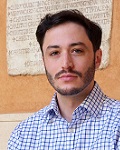2022
Mark Letteney

Dissertation Abstract
"Christianizing Knowledge: A New Order of Books in the Theodosian Age"
This dissertation approaches the rise of Christianity from a new angle: not the Christianization of people, but of structures of knowledge. An intense focus on demographic shifts and doctrinal controversies has traditionally separated classicists from historians of late ancient Christianity. But such a narrow focus occludes an epistemic unity underlying scholastic productions from the Theodosian Age, when Christians became a ruling elite for the first time. The fourth and fifth centuries saw dramatic changes in the way that scholars across disciplines approached the production of knowledge. I engage works of scholarship ranging from Roman juristic writings and legal compendia to Christian theological tractates and conciliar acta, grammatical treatises, miscellanies, and the Palestinian Talmud in order to explore the ways that imperial Christianity inflected the production of truth even in domains that do no constructive theological work. The rise of Christianity has been described as a change in the content of ancient peoples’ beliefs. My work shows how imperial Christianity changed not just what people believed, but how they believed.
The analysis comprises eight chapters. First, I trace the various ways that Christians approached the production of truth in the second, third, and fourth centuries; then the creation of a new paradigm for argumentation by scholars debating the legacy of the Council of Nicaea; and finally the proliferation of a peculiarly bookish epistemology through a diverse array of scholastic domains when Nicene Christians first came to hold significant political power. The final chapters follow a Christianized structure of knowledge from intellectual arguments to the pages of manuscripts passed among scholars in the fourth and fifth centuries. I re-describe the “rise of the code” as a central node of scholarly production in the context of the bookish preoccupations of Nicene Christians, and I trace Christian scribal practices as they were generalized, de-signified, and reused in “secular” productions like legal codices and late Roman manuscripts of Livy and Vergil. At its core, the dissertation is a study of the epistemic rupture that defines the beginning of Late Antiquity.
This dissertation approaches the rise of Christianity from a new angle: not the Christianization of people, but of structures of knowledge. An intense focus on demographic shifts and doctrinal controversies has traditionally separated classicists from historians of late ancient Christianity. But such a narrow focus occludes an epistemic unity underlying scholastic productions from the Theodosian Age, when Christians became a ruling elite for the first time. The fourth and fifth centuries saw dramatic changes in the way that scholars across disciplines approached the production of knowledge. I engage works of scholarship ranging from Roman juristic writings and legal compendia to Christian theological tractates and conciliar acta, grammatical treatises, miscellanies, and the Palestinian Talmud in order to explore the ways that imperial Christianity inflected the production of truth even in domains that do no constructive theological work. The rise of Christianity has been described as a change in the content of ancient peoples’ beliefs. My work shows how imperial Christianity changed not just what people believed, but how they believed.
The analysis comprises eight chapters. First, I trace the various ways that Christians approached the production of truth in the second, third, and fourth centuries; then the creation of a new paradigm for argumentation by scholars debating the legacy of the Council of Nicaea; and finally the proliferation of a peculiarly bookish epistemology through a diverse array of scholastic domains when Nicene Christians first came to hold significant political power. The final chapters follow a Christianized structure of knowledge from intellectual arguments to the pages of manuscripts passed among scholars in the fourth and fifth centuries. I re-describe the “rise of the code” as a central node of scholarly production in the context of the bookish preoccupations of Nicene Christians, and I trace Christian scribal practices as they were generalized, de-signified, and reused in “secular” productions like legal codices and late Roman manuscripts of Livy and Vergil. At its core, the dissertation is a study of the epistemic rupture that defines the beginning of Late Antiquity.

